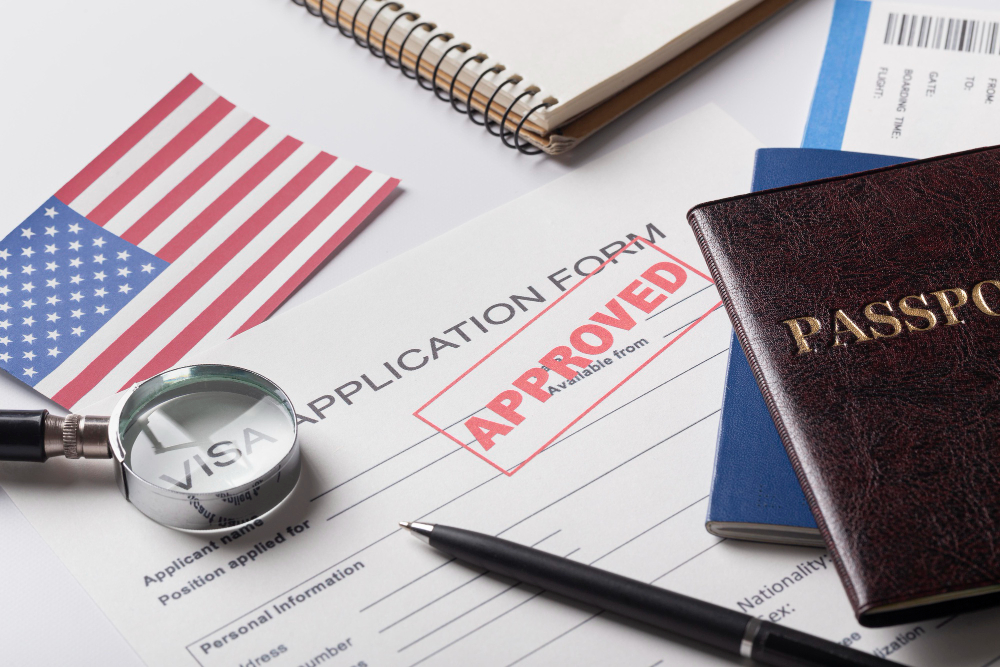Introduction
The dream of homeownership is a universal aspiration, and for Can New Immigrants Buy a House in the USA? arriving in the United States, it often symbolizes stability, roots, and a sense of belonging. However, the process of purchasing a house in a new country can be complex, with various factors influencing eligibility and opportunities. In this comprehensive blog, we’ll explore the possibilities and challenges that new immigrants may encounter when aspiring to buy a house in the USA.

Understanding the Basics (Can New Immigrants Buy a House in the USA?)
1. Immigration Status:
- The first and foremost consideration for new immigrants looking to buy a house is their immigration status. Permanent residents (Green Card holders) generally have more straightforward access to homeownership than individuals on temporary visas.
2. Legal Documentation:
- Having the necessary legal documentation is crucial. This includes a valid Social Security Number (SSN) or an Individual Taxpayer Identification Number (ITIN), which is often required for financial transactions.
3. Credit History:
- Building a credit history is essential for accessing various financial services, including mortgage loans. New immigrants may not have an established credit history in the U.S., which can affect their ability to secure a mortgage.
4. Employment and Income:
- Lenders typically assess an individual’s employment stability and income to determine their capacity to repay a mortgage. Having a steady job and a reliable income source is important for prospective homebuyers.
5. Down Payment:
- The amount of money available for a down payment is a critical factor. While conventional wisdom suggests a 20% down payment, some programs may offer options for lower down payments, especially for first-time homebuyers.
Opportunities for New Immigrants
1. FHA Loans:
- The Federal Housing Administration (FHA) offers mortgage loans with lower down payment requirements, making homeownership more accessible for individuals with limited financial resources. FHA loans are often considered a viable option for new immigrants.
2. VA Loans:
- Veterans, active-duty service members, and certain eligible family members may qualify for VA loans, provided by the Department of Veterans Affairs. These loans often feature competitive interest rates and more lenient credit requirements.
3. Conventional Loans with Alternative Credit:
- Some lenders may consider alternative forms of credit history, such as rent payments, utility bills, or international credit reports, for immigrants with limited U.S. credit history.
4. State and Local Programs:
- Many states and local governments offer assistance programs to promote homeownership, especially for first-time buyers. These programs may provide down payment assistance, favorable interest rates, or other financial incentives.
Challenges Faced by New Immigrants
1. Limited Credit History:
- New immigrants often face challenges due to their limited credit history in the U.S. Building credit by responsibly managing financial accounts is crucial for overcoming this obstacle.
2. Employment Stability:
- Some lenders may require a history of stable employment for loan approval. New immigrants might encounter difficulties if they haven’t been in the U.S. workforce for an extended period.
3. Down Payment Constraints:
- Accumulating the necessary funds for a down payment can be a significant challenge, especially for those who have recently arrived and may not have substantial savings.
4. Legal Documentation Requirements:
- Some lenders may have strict documentation requirements, and new immigrants must ensure they have all necessary paperwork, including a valid SSN or ITIN.
Navigating the Homebuying Process
1. Financial Planning:
- New immigrants should engage in thorough financial planning, understanding their budget, saving for a down payment, and addressing any outstanding debts.
2. Building Credit:
- Actively building a positive credit history is crucial. This includes responsible use of credit cards, timely payment of bills, and potentially exploring alternative credit reporting options.
3. Seeking Professional Guidance:
- Consulting with a mortgage advisor or a real estate professional can provide valuable insights into available options and help navigate the complexities of the homebuying process.
4. Exploring Assistance Programs:
- Researching and exploring state and local assistance programs can reveal opportunities for financial support, down payment assistance, or favorable loan terms.
Conclusion
The dream of buying a house in the USA is achievable for new immigrants, but it requires careful planning, understanding of the local real estate market, and knowledge of available financial options. While challenges may exist, various programs and opportunities cater to individuals with diverse backgrounds and circumstances. Can New Immigrants Buy a House in the USA? By navigating the process with diligence, financial responsibility, and professional guidance, new immigrants can turn the dream of homeownership into a reality, establishing a firm foundation in their new home country.
Frequently Asked Questions (FAQ) – Can New Immigrants Buy a House in the USA?
1. Can new immigrants with temporary visas buy a house in the USA?
- While it’s possible, the Can New Immigrants Buy a House in the USA? process may be more challenging. Permanent residents (Green Card holders) generally have easier access to homeownership, but individuals on temporary visas may face additional hurdles.
2. What role does credit history play in buying a house as a new immigrant?
- Credit history is crucial for securing a mortgage. Can New Immigrants Buy a House in the USA? New immigrants may not have an established U.S. credit history, but some lenders consider alternative forms of credit, such as international credit reports or rent payments.
3. Are there specific loan programs for new immigrants to buy a house?
- Yes, various loan programs cater to Can New Immigrants Buy a House in the USA? FHA loans with lower down payment requirements, VA loans for eligible service members, and state/local assistance programs are some options to explore.
4. How much down payment is required for buying a house as a Can New Immigrants Buy a House in the USA??
- The ideal down payment is often 20%, but some programs, like FHA loans, offer options for lower down payments. State and local assistance programs may also provide down payment support.
5. Do new immigrants need a Social Security Number (SSN) to buy a house?
- While having an SSN is common, some lenders may accept an Individual Taxpayer Identification Number (ITIN) for financial transactions, including mortgage applications.
6. Can new immigrants with limited employment history in the U.S. qualify for a mortgage?
- Employment stability is a factor considered by lenders. Can New Immigrants Buy a House in the USA? may need to demonstrate a history of stable employment or show the potential for consistent income to qualify for a mortgage.
7. Are there state or local programs that provide financial assistance to Can New Immigrants Buy a House in the USA?
- Yes, many states and local governments offer assistance programs to promote homeownership, including down payment assistance, favorable interest rates, and other financial incentives.
8. How can Can New Immigrants Buy a House in the USA? build a credit history in the U.S.?
- Building a credit history involves responsibly using credit cards, making timely payments on bills, and potentially exploring alternative credit reporting options. This helps establish a positive credit profile.
9. Is professional guidance necessary for Can New Immigrants Buy a House in the USA? buying a house?
- Seeking guidance from a mortgage advisor or real estate professional can be invaluable. They can provide insights into available options, guide through the homebuying process, and help navigate any complexities.
10. Are there specific considerations for undocumented immigrants looking to buy a house?
- Undocumented Can New Immigrants Buy a House in the USA? may face additional challenges. It’s important to stay informed about potential pathways to regularization, engage with community support organizations, and consider seeking legal guidance to navigate the process.











